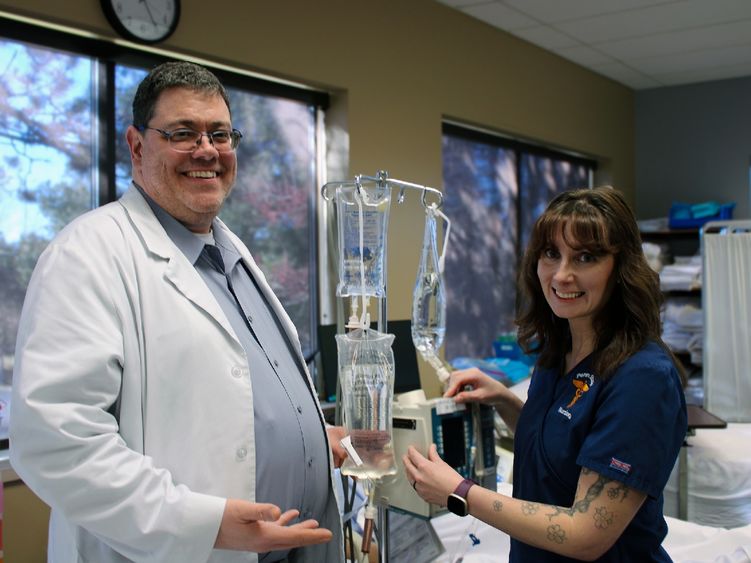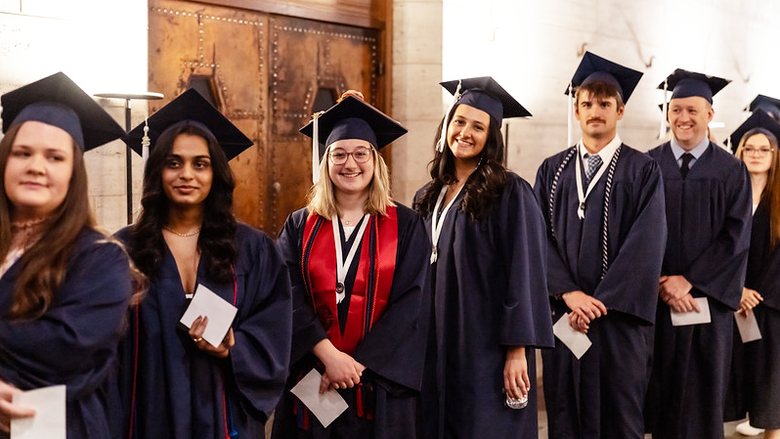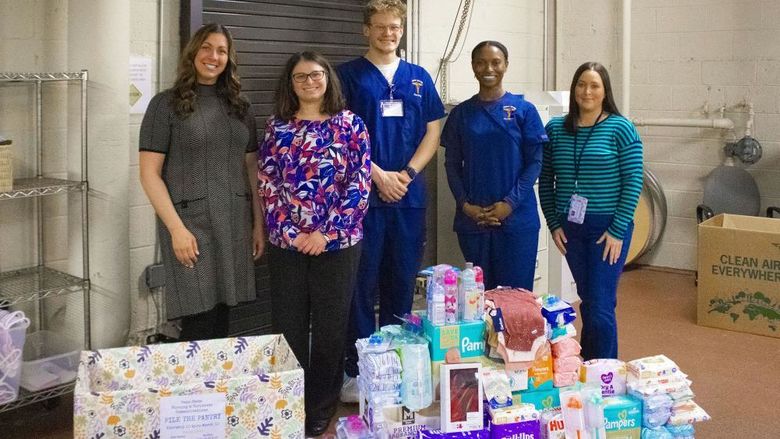
Mike Evans, assistant dean for undergraduate nursing education at the Commonwealth Campuses for the Ross and Carol Nese College of Nursing, left, will serve as a mentor to Darla Lattimer, a third-year nursing student at Penn State Scranton who has received a $2,000 Student Engagement Network grant.
DUNMORE, Pa. — Darla Lattimer, a third-year nursing student in the Ross and Carol Nese College of Nursing at Penn State Scranton and an English minor, has been awarded a $2,000 Student Engagement Network (SEN) Grant for the spring 2024 semester.
Lattimer, a first-generation adult learner and transfer student, decided to return to school after having her daughter and needing a career change. She was admitted into the University's nursing program during her second year at Penn State Scranton.
Since then, she has been inducted into the Sigma Theta Tau International Honor Society of Nursing, is an active member of the campus’ Student Nurses Association, and involves herself in campus life as much as possible — all while balancing her life working at Regional Hospital as a nurse intern on the telemetry unit and raising her 7-year-old daughter.
The grant will provide Lattimer the opportunity to shadow Mike Evans, assistant dean for undergraduate nursing education at the Commonwealth Campuses and teaching professor of nursing, at the Visiting Nurse Association (VNA) Home Health, providing a valuable opportunity to learn in a real-world health care setting.
“I was very excited to find out I was a recipient of the SEN Grant for spring 2024,” Lattimer said.
Her enthusiasm extends to the prospect of bringing holistic care into the community, influenced by Evan’s teachings on treating patients with dignity.
Lattimer emphasized her commitment to integrating these principles into her patient interactions and expressed her anticipation of honing clinical skills in the home health environment.
Evans, reflecting on Lattimer’s upcoming experience, said he hopes that Lattimer gains a greater appreciation for community health nursing.
“The majority of her clinical experiences during school are in acute care environments, and this will allow her to see the importance of the continuity of care that must continue after a patient is discharged from the hospital to allow the person to achieve optimal health outcomes,” Evans said.
During her engagement, Lattimer will provide care to patients in their homes, where she will perform physical assessments, conduct nursing interventions such as wound care and injections, and learn to advocate for patients in a home setting.
“By participating in this engagement experience, Darla will have a broader knowledge of how patients are cared for in the community, helping her no matter what setting she chooses to work in post-graduation,” Evans said.
Acknowledging the challenges of balancing life and school, Lattimer praised the nursing department’s willingness to offer support.
“What I enjoy most about our nursing program is the supportive teaching staff. I have always felt like my goals were in reach because someone was there believing that I was capable of achieving them,” Lattimer said. “The nursing staff has always been willing to just sit down and talk if I was feeling overwhelmed.”
Looking ahead, Lattimer said her post-graduation plans are to “stay in the area and work for a local hospital,” she said. “I am staying open to what the future holds beyond that.”
Evans encourages other nursing students to take part in these engagement networking opportunities.
“I hope that other third- and fourth-year nursing students take advantage of applying for student engagement awards through the Student Engagement Network,” Evans said. “It provides them with the funding they need to participate in co-curricular activities and reduces their hours at work. It truly does enhance their college experience.”
Penn State students have received more than $2.5 million in funding since the SEN Grant Program launched in 2017 and has funded over 2,500 undergraduate student engagement experiences — playing a pivotal role in connecting students with transformative opportunities.
The Student Engagement Network advances the power of participation by connecting students with experiences that empower them to make a positive impact as citizens and leaders of the world. By enabling even more students to have transformative experiences, the Student Engagement Network is helping to make Penn State a more vibrant place to live, learn and grow.





